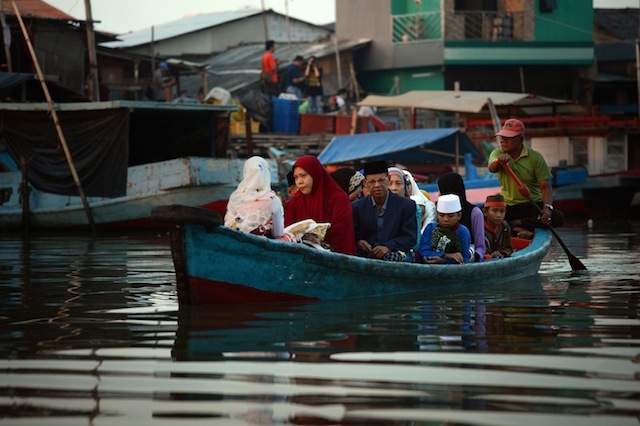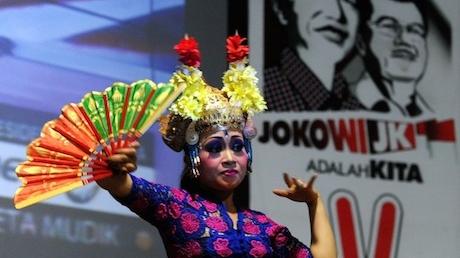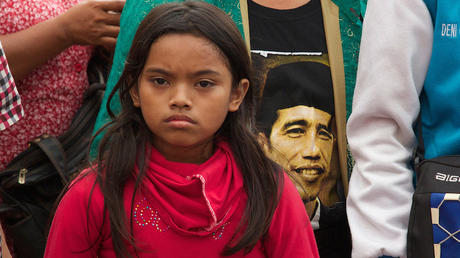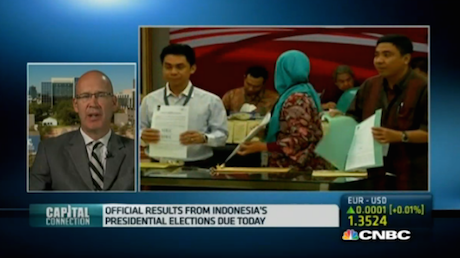
By TIM LINDSEY and SIMON BUTT
After 12 days of counting, Indonesia’s Electoral Commission declared on 22 that Joko "Jokowi" Widodo and Jusuf Kalla had won Indonesia’s hotly-contested presidential election.
With 71 million votes (53.1 percent), the pair defeated former general Prabowo Subianto and his vice-presidential running mate, Hatta Rajasa, who received 46.85 per cent. These results were close to the informal tallies that a number of reliable polling agencies released on the night of the vote, 9 April.
Although the result was much tighter than the previous two direct presidential elections, it seems a clear majority of Indonesians have decided that Indonesia should continue its democratic consolidation under the reformist Jokowi, rather than roll back some or all post-Suharto democratic reforms, as Prabowo said he would.
Prabowo is clearly infuriated by this – after all, he must be one of the few candidates in a presidential election to obtain 62.5 million votes and still lose.
Despite there being little doubt that Jokowi is the rightful winner, Prabowo has refused to concede, claiming he has been denied victory by fraud and incompetence. After much huffing and puffing, he has now formally challenged the results in the Constitutional Court. It is required to make decision within 14 working days.
This is not a constitutional crisis, as some have suggested. The Constitutional Court has exclusive jurisdiction in disputed returns cases and it is entirely appropriate that candidates be able to contest election results before it. Allegations of electoral fraud and incompetence are common in Indonesia and similar challenges have taken place after all recent elections. The odds are clearly stacked against Prabowo, however.
First, he needs to convince the Court that the Electoral Commission or his opponents committed "breaches" such as vote buying or incompetence. There is little doubt some impropriety occurred, as in most Indonesian polls. Reputable commentators agree, however, that Prabowo's supporters – notorious for "black campaigning" – were responsible for most of the problems.
Second, Prabowo must prove that the breaches were "systematic, structured and massive". He claims that irregularities occurred in about 10 per cent of the half a million polling stations and that this affected about 21 million votes – well in excess of the 8 million votes by which Jokowi won.
But it will be extremely difficult for him to establish this. During the counting period, the Electoral Commission allowed transparent online access to tallies from individual voting stations, along with district and provincial tallies. Innovative social media groups then created new software that allowed volunteer "netizen" scrutineers to conduct online parallel counts that confirmed the accuracy of the commission’s tally.
Even the head of Prabowo’s campaign team, former Constitutional Court Chief Justice Mahfud MD, said that proving that just 200,000 votes were fraudulent, let alone 8 million, is "impossible" and that bringing the case to court is "simply pointless". He resigned as head of Prabowo’s campaign last Friday.
Some commentators believe Prabowo’s supporters may be able to bribe the Constitutional Court. They point to the recent jailing for life of Mahfud’s successor as chief justice, Akil Mochtar, for massive corruption in local election disputed returns cases. Ironically, Mochtar’s disgrace and the resulting intense scrutiny of the court means the remaining judges are, in fact, more likely to be squeaky-clean in their handling of this case.
It is, however, possible that the court will require re-votes or recounts in a limited number of polling stations if Prabowo can put enough evidence before it of impropriety in those stations.
This may cause some confusion and give Prabowo ammunition to attack the overall result, but unless the number of votes at stake exceed the number that Prabowo needs to overtake Jokowi, it will be an academic exercise. It is unlikely to delay the inauguration of the new president on October 22.
Third, the Constitutional Court has a very strong interest in keeping Prabowo from the presidency: its own survival.
One of the platforms on which Prabowo campaigned was "returning to the 1945 Constitution". This was primarily designed to concentrate power in the presidency but was only ever intended to be temporary. It nonetheless became the legal basis for the "new order" regime of Prabowo’s former father-in-law, Suharto, legitimising his authoritarian rule for 32 years. When Suharto fell in 1998, the 1945 Constitution was overhauled to establish a new democratic political system, with strong checks and balances, many of which are enforced by the Constitutional Court, itself established as part of that overhaul.
If Prabowo wins, and rolls back these constitutional reforms, then the Constitutional Court might find itself on the chopping block. Its judges are likely to have this in the back of their minds when making their decision.
In fact, there are already signs that the large coalition of political groups that Prabowo stitched together to support his bid is beginning to unravel. Regardless of his posturing, the elite are already moving to reconfigure themselves around Jokowi, his canny deputy and Jokowi’s party leader, the tough former president Megawati Sukarnoputri.
But Prabowo will not give up easily, whatever the Constitutional Court decides. He may well emerge as a focus for opposition to Indonesia’s new president, and a significant source of obstruction in the legislature, where Jokowi controls only about 20 per cent of the seats.
This is problematic for Jokowi, as he will need to start making real change very soon if he is to keep the trust of the Indonesian people, frustrated by what they see as a decade of inaction by the Yudhoyono administration. With a spurned suitor like Prabowo looking for revenge, Jokowi’s honeymoon may well prove to be a short one.
Professor Tim Lindsey is director of the Centre for Indonesian Law, Islam and Society at the University of Melbourne.
Associate Professor Simon Butt is associate director for the Centre of Asian and Pacific Law at the University of Sydney.
This article was first published on 30 July by Fairfax (The Age): Link here



